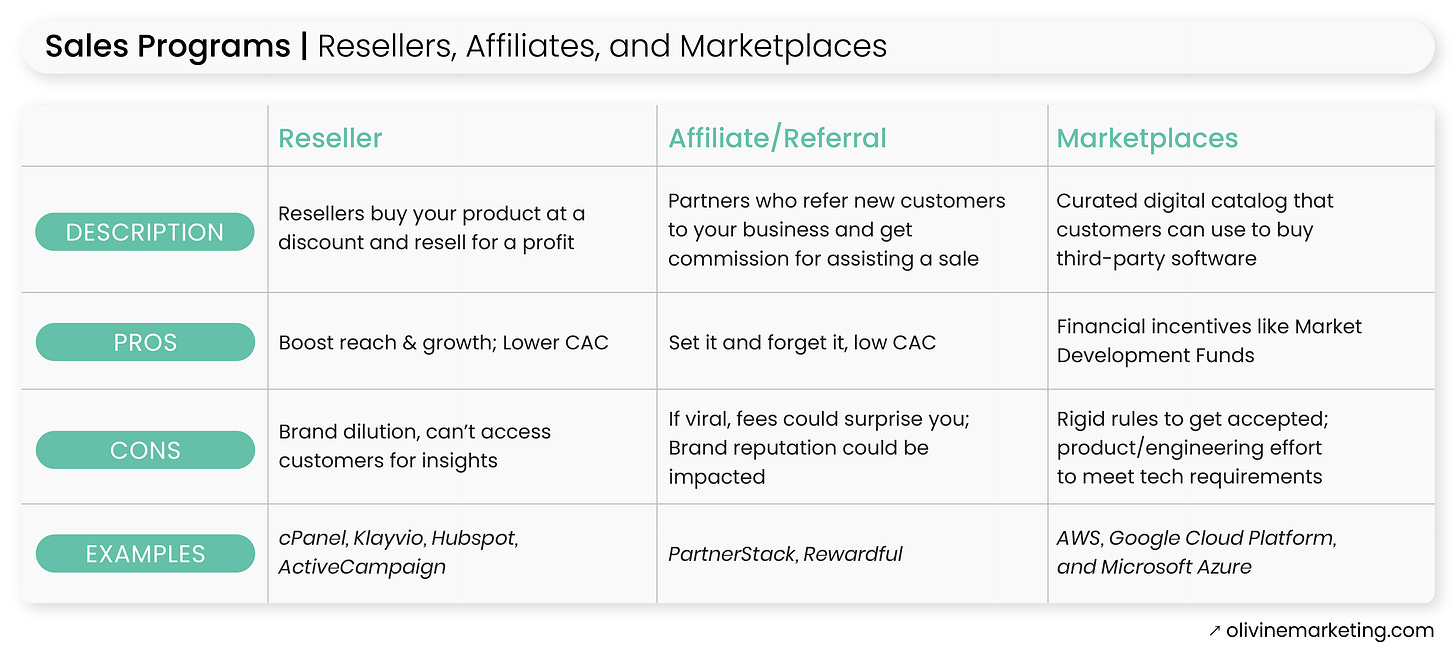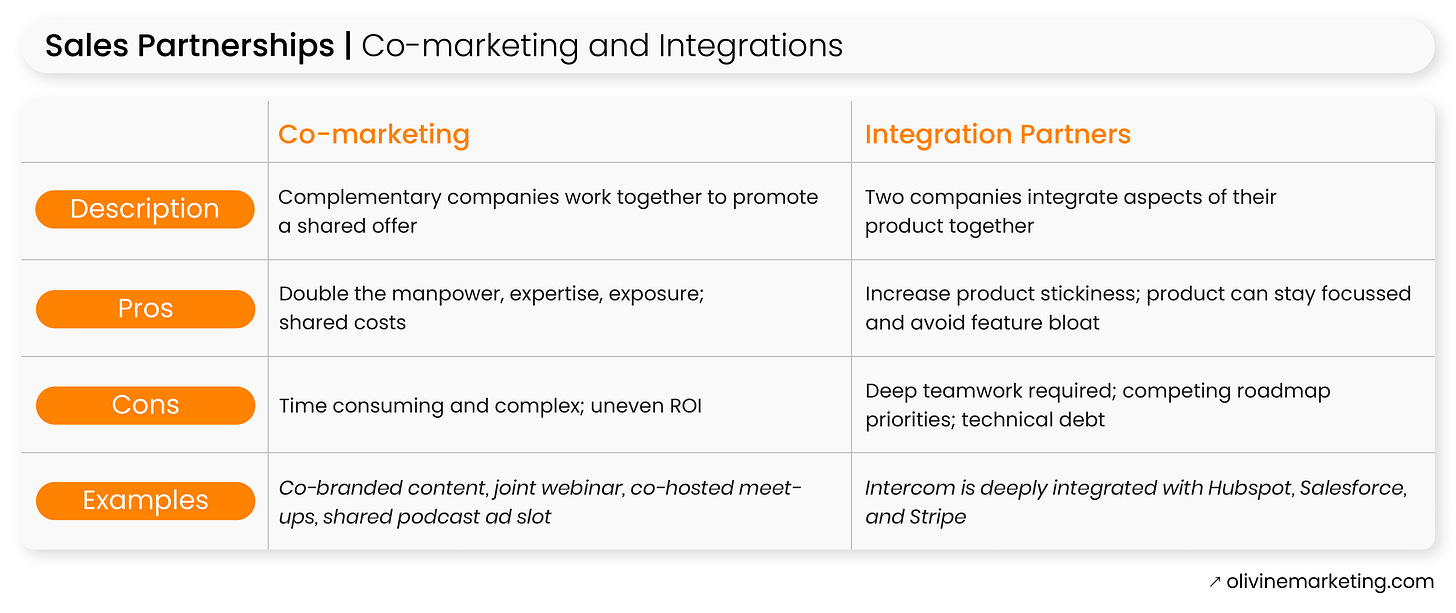Inside Olivine #5
🤑 Untapped revenue aka how to drive sales without a sales team with Megan Liken
Howdy!
Megan Liken here, Product Marketing Manager at Olivine based in Houston, Texas. I’m a part-time digital nomad who is currently obsessed with learning more about human design, astrocartography, and the power of breathwork. Next stop, Bali. 🤠 🌌 🏖
Hot topic: partnerships are an untapped way to drive sales
When I worked at cPanel, we didn't have a sales team but developed hundreds of reseller partners across the globe. Whether your company doesn’t have a sales team just yet, you don’t plan on hiring sales (like Atlassian did for a while), or you’re just interested in some new strategies to complement your sales function — partnership programs are an untapped way to drive sales. This won’t cover every partner scenario, but here are some tactics I’ve seen work.
Here’s the TL;DR on sales without a sales team:
Okay, now to go deeper:
Invest in a channel partner & reseller programs
Channel Partner Programs are a great way to expand your reach and accelerate sales. In a channel sales model, your company sells through third-party partners such as affiliate/referral partners, who get commission on each purchase, and resellers, who are value-added providers that typically bundle your product with their own.
Reseller: Reseller partners purchase your product, often at a discount, and resell them to end-users for a profit. A few example companies that have robust reseller programs are cPanel, Klayvio, Hubspot, ActiveCampaign, and many more.
Pros:
Boost your growth and scale your sales, while decreasing your CAC costs
Greatly increases your reach into new markets and customer segments
Outsource your customer onboarding and support
Cons:
Don’t own the customer experience, which can cause brand dilution
Heavy lift to design a training program and produce partner enablement materials
Difficult to access end-users for feedback, insights, or testimonials
Affiliate/Referral: Third-party or referral partners who refer new customers to your business and get rewarded for assisting a sale. PartnerStack, Rewardful, and many others do this out of the box.
Pros:
Set it and forget it: Simple and passive way to drive sales
Customer acquisition cost goes down
Higher conversion rates become of the warm introduction a referral
Cons:
Paying out affiliates/referral partners could end up blowing your budget
Messaging and positioning can become diluted
Brand reputation could be impacted
Add your product to existing marketplaces
Marketplaces like AWS Marketplace, Google Cloud Platform, and Microsoft Azure are platforms that provide a new sales channel for independent software vendors and technology partners to sell their solutions.
Pros:
Your customers are already there
Free money: Financial incentives like MDF (market development funds) which supplement things like your ad budget in order to drive traffic to your listing
Hand holding: Account representatives are assigned to you and provide step by step guidance on how to create and optimize your listing
Cons:
Rigid rules and requirements to follow within the program
Must already be profitable and meet revenue targets to be considered
Product and Engineering can become strained in order to meet technical requirements
Develop co-marketing campaigns with complementary brands
Co-marketing campaigns provide companies with an opportunity to work together to promote a shared offer — such as a co-branded product or a piece of content. In a co-marketing partnership, both companies promote that offer and share the costs for marketing and advertising. Example: joint webinars; sharing a podcast ad slot; co-hosted meetups.
Pros:
Double the manpower, expertise, and exposure (and boost SEO)
Save money by sharing the cost of marketing and advertising across multiple budgets
Improve brand reputation, especially if partnering with well-established brands
Cons:
Time consuming and complex (two brands and two legal teams that need to approve)
Uneven contribution from either team, “the team project phenomenon”
Uneven ROI across the two brands
Upsell and cross-sell with integration partners
Integration partners are formed when two companies agree to integrate aspects of their product together. This often allows each company to focus on its core features and use the partner’s offering to extend the value of its product. For example, Intercom is deeply integrated with Hubspot, Salesforce, and Stripe.
Pros:
Increase stickiness of both products
Perfect candidates for powerful co-marketing campaigns
Stay focused on core features and avoid product bloat
Cons:
Deep teamwork required
Product teams have differing priorities and roadmaps
Existing technical debt slows down the project or makes it not viable at all
To recap: partnerships are a great way to supplement your existing sales team or find new and creative ways to increase your revenue.
Top tweet

As a leader, focusing only on product and sales isn’t a bad thing, it’s definitely part of the recipe for success, but mastering the art of storytelling is really what will set you apart and accelerate your growth. It’s how you differentiate yourself in marketing, sales, hiring, and fundraising efforts.
Fresh finds
Tool I love
OneTab will restore your sanity. Collapse your web tabs into an organized list of hyperlinks.
Shallow dive
Homescreen is a snack-sized, curated news source for founders.
Deep dive
EBook: Which Acquisition Channels Consistently Work for Founders? I Found 34 (created by ZeroToUsers).
Inside Olivine
Content gems
Client happenings
Hookdeck snares $2.4M seed to help developers manage webhooks (Hookdeck came through FMP, our founder program)
Smallstep raised $26M to bring you the best way to secure your infrastructure with certificates
Masa Finance founder Brendan Playford talks decentralized credit on CryptoCoinShow
Thanks for reading! We’ll see you next month.










